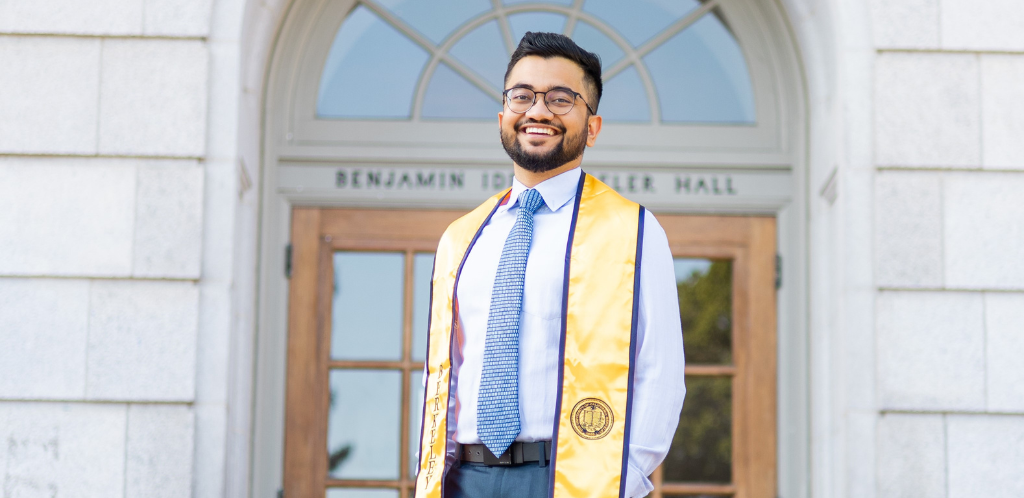Vishrut Rana (B.S. ’22 IEOR) on Choosing Academia

IEOR sat down with brand new UC Berkeley Alumnus, Vishrut Rana, to discuss his decision to pursue a Ph.D. after graduating from the IEOR department this past Fall.
Where will you be pursuing your doctorate, and when does your program begin?
I’ll pursue my doctorate studies at The Wharton School, University of Pennsylvania, in the Operations, Information, and Decisions department, and my program begins in late August 2022. I was lucky enough to have some other wonderful offers, but I believe the program at Wharton provides the flexibility and application-driven environment to match my research interests.
What are you most passionate about and how will pursuing your PhD help you follow your passion?
I’m deeply passionate about the clean energy revolution that we are living in, and through my PhD, I hope to be a part of this revolution. The scientific community is collectively devising innovative interventions to control the detrimental effects of climate change and I want to contribute to this journey. Personally, I am interested in addressing the operational challenges that arise with the changing nature of our energy systems. I aim to help improve the efficiency and reliability of electricity markets with an increasing penetration of variable renewable energy generation and the availability of energy storage technologies.
As an undergrad, was there a tipping point that made you realize you wanted to pursue academia? When did you realize you wanted a doctorate?
Absolutely, I had a clear tipping point, albeit much later than most students! In my junior year, I took a simulation class (IEOR 174) with Prof. Zeyu Zheng where we were involved in a semester-long course project. My team and I developed a detailed airport queueing simulation model and I distinctly remember the process being delightful. This experience left me fascinated with the idea of research and what followed was my involvement in two more serious research projects during the summer with Prof. Candi Yano and Dr. Tim Lipman (at LBNL). Through these projects, I realized that I cherished the intellectual freedom that came with research. In the fall of my senior year – about two months before doctorate applications are due – I presented my preliminary findings with Prof. Yano at the INFORMS Annual Meeting, and I was convinced that I wanted to pursue a PhD. While the realization happened so quickly, I’m glad I got the opportunities that I did, and everything eventually fell into place.
Do you have an area(s) of research you are most interested in focusing on in graduate school? If so, what type of research and why does it interest you?
In addition to my primary interest in electricity markets and broader energy systems, I am also keen to address many other operational challenges that arise in age-old industries. I believe that with advancement in analytics tools, we can identify and solve problems associated with industries that rapidly grew in an isolated post-war world and form the foundation of today’s interconnected world – think supply chain, manufacturing, and transportation. There is tremendous scope to make these industries more safe, sustainable, and equitable by using tools of operations research. In graduate school, and hopefully, through my career that follows, I wish to take this application-driven approach to research.
Are there any people or resources that were particularly helpful to you while you were going through the graduate school admissions process? If so, what were they?
My biggest resource was having supportive undergraduate research advisors in Prof. Yano and Dr. Lipman – some of the tips they shared before and during my application process will stay with me for the rest of my life. Additionally, I found my interactions with current and prospective doctoral students very helpful – these are people who have faced or are facing the same problems as you and having them as a support system can be very helpful not just during the application process but also to evaluate your admission offers. Through the application process, I also realized that the operations research community is very warm and welcoming, and received a lot of helpful tips from connections on Twitter!
What do you hope to do after receiving your doctorate?
Haha, this is a challenging question! I’m truly not sure yet and much like my approach to undergraduate education, I want to leave all doors open and trust that I will eventually find something that suits me best. I do know that I would like to continue my journey of intellectual exploration – whether that happens in an academic position or in an industry research position remains to be seen.
Do you have any advice for underclassmen interested in pursuing their doctorate?
It’s important to be involved in some form of undergraduate research, to get a feel for the process and to assess whether you enjoy it. Talk to as many professors and graduate students about their work, ask them questions about graduate school, and try to learn about innovations happening in your field of interest outside classes – curiosity will take you a long way! If you’re convinced to apply to doctoral programs, try to cast a wide net on the types of programs you apply to – you can always evaluate different programs once you receive offers of admission. Most importantly, if you’re uncertain about what’s best for you, trust your gut and, as the common saying goes, don’t ask why, ask why not!